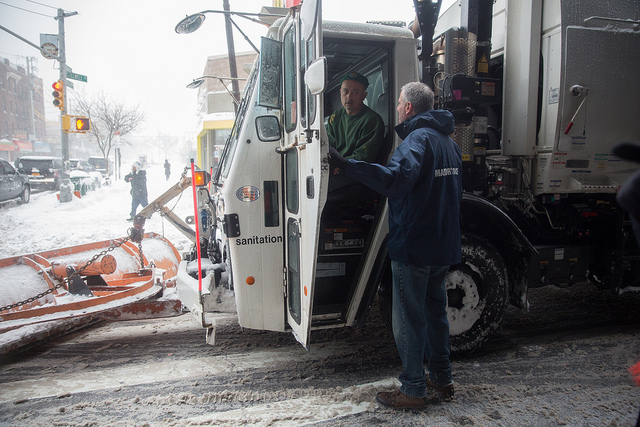
(photo: Michael Appleton/Mayor's Office)
Recent news that the New York City Department of Sanitation had its trucks evicted from a Chelsea garage on West 30th Street and will now park them on a side street near Manhattan’s Bellevue South Park should raise a question: why does Sanitation need to garage its trucks in the first place? It's not as if sanitation trucks are Lamborghinis requiring careful protection or 1970s era Jaguars that spent more time in the shop than on the road.
Since Sanitation is street-parking the trucks now, and has for several years over near the West Side railyards, why are any garaged overnight at all?
Sanitation, and thus the City, could realize substantial efficiencies, capital and operating cost reductions in its garage operations by using an "asset light" strategy with a much smaller footprint for its structures.
Some of the city’s 2,100 garbage collection trucks have been maintained for years outdoors in various locations throughout New York City.
What if Sanitation used small fueling and washing facilities around the city where, say, a half-dozen trucks could be power-washed and fueled at a time, every so often, in a "roll-in, roll-out" facility, and then parked at a location near the start of their routes?
According to press reports, the Sanitation workers union rules require its trucks to be parked near Sanitation facilities that house lunchrooms, showers, and locker rooms. But what if that were not the case? What if the City were to negotiate with the sanitation union so as to use existing facilities in police precincts, hospitals, firehouses, or in some of the smaller footprint Sanitation fueling and washing facilities, and park its trucks near those facilities?
Why couldn't workers, who are actually first responders to some of New York City’s worst weather events, be reimbursed for parking their personal vehicles in commercial parking lots and garages or at reserved parking spots near where the trucks they operate are parked, along with the 1,000 or so cars and light-duty trucks sanitation department operates?
Certainly, there are some department vehicles that would still need to be garaged. Mechanical brooms, front-end loaders, and snow-melters don’t really lend themselves to outdoor parking. But there are less than 800 of those vehicles -- of the total 3,400 Sanitation vehicles -- and they could be spread among smaller facilities throughout the city.
Going asset light would allow Sanitation to sell off massive garages that occupy huge footprints, some on prime real estate, in Manhattan and the four other boroughs, and instead operate from smaller ready and repair shops where trucks could be cleaned, fueled, and serviced on a fixed schedule and prepared for snow removal service. Equipment for maintenance, repair, and snow-plow service could be trucked to these smaller footprint satellites from central locations in industrial areas of the five boroughs on an as-needed basis.
All of this would, of course, require a radical rethinking of the way the Department of Sanitation currently operates. The unions would have to buy in and members compensated by some means, perhaps by a shorter workday as routes would be accessed more quickly. But re-thinking how Sanitation functions would reduce its operating costs and allow existing facilities to be sold off for development -- as warehouses for UPS, Amazon, FedEx, or other commercial businesses; to ameliorate a dearth of active park play space in Manhattan and other boroughs; or to develop into affordable housing.
“Amazing Grace” Hopper, the pioneering computer scientist and U.S. Navy Reserve admiral who laid the groundwork for COBOL, UNIVAC, and other world-changing computer technology, once said that “The most dangerous words in the English language are, ‘That’s the way we’ve always done it.’”
The Department of Sanitation and civic leaders should take the admiral’s words under advisement and re-think the means by which the city operates the department.
***
J.G. Collins is the managing director at The Stuyvesant Square Consultancy, an advisory and consulting firm. On Twitter @StuySquare.
***
Have an op-ed idea or submission for Gotham Gazette? Email This email address is being protected from spambots. You need JavaScript enabled to view it.




